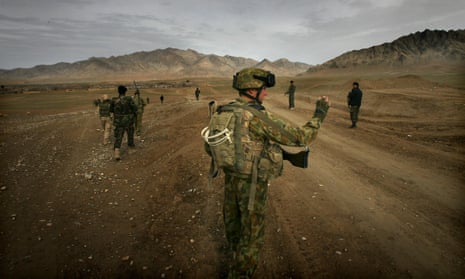The Australian government is under increasing pressure to evacuate Afghan staff who have supported its diplomats and soldiers across Afghanistan, as the US and UK announce plans to pull thousands of at-risk allies from the country.
All foreign forces are expected to be out of Afghanistan in under 100 days, by 11 September.
The Returned and Services League has urged the government to do the “right thing”, while former officers who served in Afghanistan have said the threat of Taliban retribution was increasingly real.
“If we don’t get them out very soon – and I’m talking in the next several weeks – many of them are going to be killed,” Maj Stuart McCarthy, a retired Australian officer who served in Afghanistan, told the ABC.
“I estimate 300 Afghan staff in Afghanistan now and probably if you include their family members, a figure of about 1,000 people. These people need to get out now. The Australian government needs to step up.”
Government sources say a proposal for an evacuation mission has growing support at senior levels of the departments of foreign affairs and trade, and within defence.
The US and UK have already announced plans for large-scale evacuations of local staff members who have supported their militaries’ missions, out of concern their support for foreign militaries will make them targets for Taliban reprisals.
Interpreters, guards and other staff who have served alongside coalition forces – often wearing their uniforms – are regular targets for Taliban violence.
US advocacy group No One Left Behind estimates that since 2016 more than 300 interpreters have been killed for their service to American troops, a rate of two a week.
US chairman of the joint chiefs of staff, Gen Mark Milley, told a Pentagon briefing “there are plans being developed very, very rapidly here” to evacuate Afghan citizens who had worked for the US military, ahead of September’s troop pullout.
Milley said it was important the US “remain faithful to those who had supported the war effort … and that we do what is necessary to ensure their protection and, if necessary, get them out of the country.”
As many as 18,000 Afghan nationals have applied for US visas to emigrate to America with their families.
Meanwhile, the UK government has said it would evacuate up to 3,000 Afghan nationals alongside its troops, saying it recognised it held a “moral obligation” to find safety for those who had served its forces.
“With western powers leaving, the threat is increasing, including targeted attacks by the Taliban,” defence secretary Ben Wallace said.
Afghan national staff had “sacrificed a lot to look after us and now is the time to do the same”, he said.
Coalition forces will have withdrawn from the country, after 20 years of conflict, by 11 September.
Australia has announced no plans beyond its existing “locally engaged employee” resettlement program, which has resettled about 1,400 Afghan workers and their families in Australia since 2013.
Even of this program, there are criticisms that applications can take up to seven years to approve, while Afghanistan’s security situation is predicted to rapidly deteriorate, with the Taliban forecast to be quickly resurgent.
“Our staff know we must act as quickly as we can to process these applications, they are a very high priority … recognising the service they have given us,” Dfat secretary Frances Adamson told estimates last week.
Government sources say there are ongoing discussions about evacuating some of the Afghan staff who have served Australia – some for years – at most acute risk when foreign soldiers leave.
The logistics of who would take priority – and where those evacuated would be taken – is currently being debated.
McCarthy, who served two tours in Afghanistan, has provided to government an evacuation plan arguing “Australia has a moral, ethical and legal duty of care to evaluate these civilians from Afghanistan as soon as possible.”
He has proposed Afghan nationals being evacuated from Kabul and other sites across Afghanistan to an “intermediate staging base”, in the United Arab Emirates or another allied third country, where initial visa processing, health checks and administrative work could be undertaken.
Afghan national staff who have worked for Australia have already passed stringent identity and security checks.
Evacuees would then be flown by charter flight to Australia to quarantine at Howard Springs or similar quarantine facility.
In an interview, McCarthy said that without interpreters, the Australian forces deployed to Afghanistan “simply couldn’t have done our job”.
“They faced exactly the same risks that we were facing, even with our combat troops on the ground. Their lives were in danger back then, and we had a very close bond with them ... if we don’t get them out very soon – and I’m talking in the next several weeks – many of them are going to be killed.”
National president of the Returned and Services League (RSL), Maj Gen Greg Melick, said Afghan national staff had provided invaluable, at times lifesaving service to Australians deployed in Afghanistan, “and we have an obligation to help them”.
“Reprisals are likely on Afghan locals who assisted Australian forces and officials, with Taliban threats already emerging to such personnel who worked with coalition forces.
“Safe passage to Australia is the right thing to do for those who have directly assisted Australians.”
Seventeen organisations from across eight coalition nations, campaigning for the rights of local Afghan workers – including the Australian-based Forsaken Fighters – have written an open letter calling for coalition countries to coordinate evacuations, and to “provide immediate protection to Afghan staff and their families who are facing threats”.
The letter, sent to Australian prime minister Scott Morrison, said translators “fear that they are excluded from Nato’s ambition to be ‘united in leaving together’”.
“They are afraid that they will be left behind not only due to inconsistent criteria, but also because the deteriorating security situation makes it impossible to travel to interviews and obtain documents in time.”
